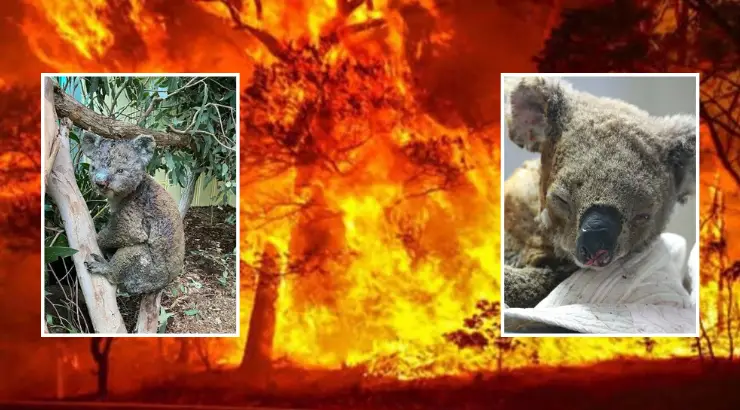Animals
Tens of Thousands of Koalas Feared Dead as Australia Fire Crisis Reaches Kangaroo Island
The number of koalas impacted by Australia’s fire crisis has been estimated at roughly 50,000.

(TMU) — Tens of thousands of koalas are feared dead after South Australia’s Kangaroo Island went up in flames in what a local mayor called the “most devastating, shattering day” for the island community.
The island is known as a haven for the species and the only refuge for koalas that is free of chlamydia—a sexually-transmitted epidemic that has devastated Australia’s koala population.
Australia’s Seven News reported Saturday that the koala population impacted by the recent uptick in fires has been estimated at roughly 50,000.
Department of Environment officials say that local management of the disaster remains crucial to ensure that the disease doesn’t affect the local population.
Koalas that have suffered burns from the KI bushfire are being dropped off at the Kangaroo Island Wildlife Park. This mum and Joey were picked up by a CFS crew this morning #7NEWS pic.twitter.com/sd9rYhdXeX
— Casey Treloar (@CaseyTreloar7) January 4, 2020
Bushfire recovery fighter Brenton Gear said:
“We’ve received reports that some koalas from Kangaroo Island have been taken to Adelaide by people who want to get help for them.
It’s understandable and heartening that people want to rescue these animals, but unfortunately it will mean that those koalas can’t be returned to the island because of the risk of contamination of the population there.”
Chlamydia is a sexually transmitted disease that has impacted wild koala populations at a 100-percent infection rate in some zones and is also widespread among humans. The infectious bacteria can cause infertility, death, and other diseases like blindness and bladder inflammation among the herbivorous marsupials.
Conservationists had largely seen the koala population of Koala Island as a last bastion for the species, capable of ensuring the survival of the threatened marsupials. In July, the University of Adelaide published a report quoting University of Adelaide School of Animal and Veterinary Sciences Ph.D. candidate Jessica Fabijan, who said:
“The impact of Chlamydia on populations of koalas in Queensland and New South Wales is devastating, with high levels of severe disease and death, and common infertility.
This last large, isolated Chlamydia-free population holds significant importance as insurance for the future of the species. We may need our Kangaroo Island koalas to re-populate other declining populations.”
Since fires began to burn in the national park, the Kangaroo Island Wildlife Park has taken a number of koalas into its care.
https://twitter.com/Triplejay58/status/1213674742638632960
Officials fear that the recent fires have left a number of koalas stranded and burnt, with an incalculable amount of koalas affected by the still-ongoing fires, which continue to burn amid an unprecedented national crisis.
While the animals of Kangaroo Island are isolated from the broader population of Australia and free of the disease, any introduction of chlamydia to the island could result in the further devastation of local koala populations.
The grim news comes after federal environment minister Sussan Ley told ABC radio last month that up to 8,000 koalas had been killed by the fires. The official noted that she’s been hard at work trying to establish corridors and plans to release hospitalized koalas. She added:
“We’ll know more when the fires are calmed down and a proper assessment can be made.”
https://twitter.com/AusIndiMedia/status/1213317250838491136
Ecologists fear that nearly 500 million mammals, reptiles and birds are estimated to have been killed since the fires broke out in September, although the current death toll is impossible to calculate. The massive loss of life threatens to forever tip the balance for entire species of animals and plants on an island continent where 87 percent of wildlife is endemic to the country, meaning it can only be found on Australia.
Kangaroos, koalas, wallabies, wombats, potoroos, bandicoots, echidnas, possums, and other species all have populations that live in regions currently being devastated by the fires—and because the fires have extended to the wetlands, dry eucalyptus forests, and even rainforests, the animals have no place to find refuge.
While numerous scientists have sought to debunk earlier suggestions that koalas have been rendered “functionally extinct” as sensationalistic and exaggerated, the species is still faced with a grave threat by the unprecedented fires stoked by strong winds and a brutal heatwave.
Last month, ecologist Mark Graham of the Nature Conservation Council told a state parliamentary inquiry that koalas typically “really have no capacity to move fast enough to get away” from the massive and fast-moving crown fires that spread across treetops. He added:
“The fires have burned so hot and so fast that there has been significant mortality of animals in the trees, but there is such a big area now that is still on fire and still burning that we will probably never find the bodies.
We’ve lost such a massive swathe of known koala habitat that I think we can say without any doubt there will be ongoing declines in koala populations from this point forward.”
The Port Macquarie Koala Hospital has become a rallying point for those concerned about Australia’s beloved koala population. Since the crisis broke out, a GoFundMe page for the hospital titled Help Thirsty Koalas Devastated by Recent Fires has received over $2.15 million USD ($3.1 million AUD)—an all-time record in terms of funds raised for an Australian entity.
Ok, so
Australia is on fire and has been for over 6 months now and
it's constantly getting worse. People and animals are losing their homes and people and animals are dying!!
More than 30% of the Koala population is now GONE!
Everything is burning and we NEED HELPPlease RT
1/? pic.twitter.com/cjTThOdMG7— ?️? Allanah ??️ (@AllanahVAFitzy) January 2, 2020
By Elias Marat | Creative Commons | TheMindUnleashed.com
Typos, corrections and/or news tips? Email us at Contact@TheMindUnleashed.com
